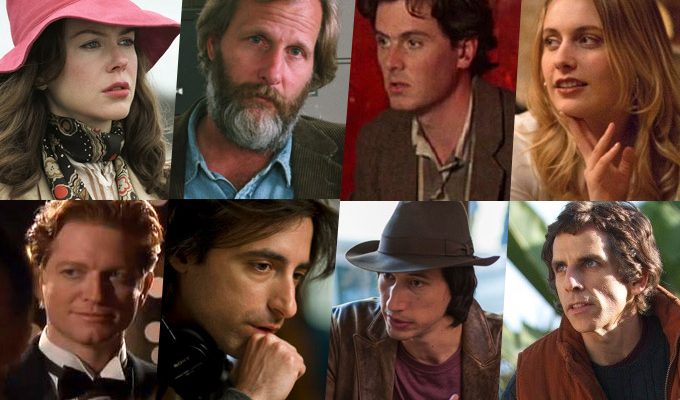
“Mr Jealousy” (1997)
Often called “Noah Baumbach’s worst film,” “Mr Jealousy” may just about fit that bill (at least for anyone who hasn’t seen “Highball“) but that doesn’t make it bad bad. In fact, shorn of any expectations of greatness and looked on as an artifact of the late-90s East Coast indie scene, “Mr Jealousy” plays well: an amiable romantic comedy whose main strength is its charm, and whose main flaw is that it’s just charm. Stylistically it feels like a supergroup — Whit Stillman tackling a brazenly mid-period Woody Allen plot embellished with New Wave flourishes (iris-in transitions; laconic omniscient voiceover). But thematically, it’s as personal as any of Baumbach’s films, with his recurrent preoccupation with lifestage-related paralysis and fear of creative impotence as well as his tendency toward intense self-analysis forming the impetus of the plot. But while there are some genuine insights and well-pitched performances (Eric Stoltz and Annabella Sciorra are appealing as the central pair, but Carlos Jacott and Chris Eigeman steal the film in supporting roles), the prickly dialogue that marked out “Kicking and Screaming” only spikes intermittently, and so the film overall goes down just a little too easily, a little too unremarkably. Embarking on a new relationship with unconvincingly “clumsy” but forthright and sexually experienced Ramona (Sciorra), aspiring writer Lester (Stoltz) resolves not to let his jealousy of her former boyfriends scupper the romance. But upon encountering one of those exes, successful writer Dashiell (Eigeman), Lester’s worse nature takes over and he follows him to his therapy group, led by Dr. Poke (Peter Bogdanovich). Of course, Lester joins the group, under the pseudonym of his best friend Vince (Jacott) who, in perhaps the Woody Allen-est twist of all, feeds Lester his real angst so that he also gets free therapy-by-proxy. The convolutions of this doomed plot fairly soon overwhelm any actual depth, but Baumbach has affection for his characters, so while “Mr Jealousy” does inevitably feel a bit ordinary, there are still some nice touches. Ramona is an unusually independent object of affection; Dashiell a very sympathetic “villain,” and Vince a charming sidekick. The main reason, though, if not the worst, that it is definitely among the least of Baumbach’s movies, is that Lester’s life lesson is not particularly hard-learned: it’s breezy and low-stakes, and nothing in “Mr Jealousy” cuts too deep. [B-]

“Highball” (1997)
It’s a bit unfair to critique, or even include, this title as it was never meant to be seen. When Baumbach finished “Mr Jealousy” in 1997 he put together a quick experiment using most of the same cast and six available days to shoot an off-the-cuff narrative that revolved around the Brooklyn apartment of a married couple and the disparate friends who come over for various parties. Set over the course of three soirees— a birthday celebration, a Halloween costume party and a New Year’s fete— “Highball” is essentially a collection of thin conversations and quips stitched together into a fractured, often bitter history of these various friendships. Outside of the “Mr Jealousy” cast (Eric Stoltz, Carlos Jacott, Chris Eigeman, Annabella Sciorra, Peter Bogdanovich — doing impressions the entire time) other cameos include Ally Sheedy and Rae Dawn Chong playing themselves, Justine Bateman, Luna frontman Dean Wareham, who would go on to become a musical collaborator soon after and Baumbach himself. Sadly, the film is, glaringly, not actually about anything and Baumbach decided to scrap it, but after he fell out with the producer, Shoreline Entertainment put it out against his wishes (he then took his name off the film and used the pseudonym Ernie Fusco). And so what feels like a home movie goof between Baumbach and some friends was haphazardly slapped together — the incoherent editing appears to have been done by a high school student as mistakes, unintentional jump cuts and missing frames litter the movie — and released as “Highball.” For hardcore Baumbach-ites there are a few curious pleasures: the director’s acting (no worse than anyone else’s in the film, frankly); the underrated Carlos Jacott, a Baumbach regular, doing his thing, and of course the highlight, the hilariously bad/awesome “Everybody Felix” closing credits song performed by Wareham. But for the most part “Highball” is tedious in the extreme — exactly why the filmmaker never wanted it released. But its looseness does point to something that Baumbach craved and eventually made happen: a reinvention of his form and method, favoring spontaneity over labored filmmaking. One could even go far as to see it as his proto-“Schizopolis,” the experimental film that Steven Soderbergh made as a cathartic purge to get him out of his filmmaking funk. Baumbach would reclaim his mojo on his next film, but it wouldn’t be until “Frances Ha” that he would finally discover the reboot he was after, the roots of which can be seen in “Highball.” [Grade Withheld/Real Talk: D+]

